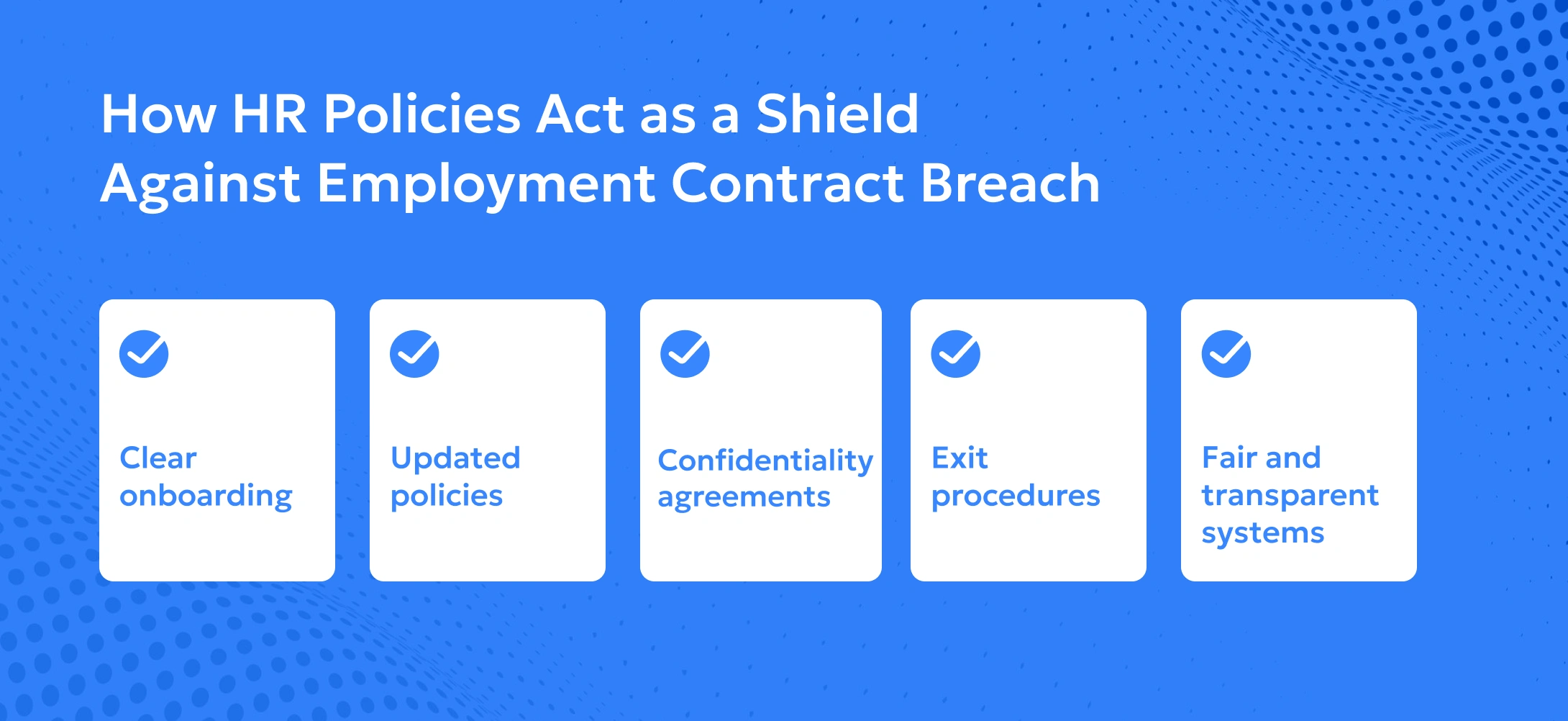
Table of Content
What happens when an employee commits an employment contract breach?
Sometimes, it is not done on purpose. An employee may quit early, share company data, or forget to follow the terms because the contract was not clear. But even small mistakes like these can cause big problems. The company may face work delays, money loss, or even legal trouble.
A major Bank went through this when one of its employees left before completing the required service period. Luckily, the bank had a proper contract that helped it take legal action and recover the loss.
In this blog, you will learn what an employment contract breach means, what the law says about it, and how good HR policies can help avoid such issues.
An employment contract breach happens when either the employer or the employee does not follow the terms written in the employment agreement.
There are three common types of breaches:
For example, if an employee suddenly leaves during an important project, the team may struggle to complete it on time. This kind of situation is a typical employment contract breach that causes loss to both the company and the employees involved.

Yes, it is. Under the Indian Contract Act, 1872, an employment contract becomes legally binding when it meets the basic conditions of a valid contract. These include:
The Act ensures that both parties clearly agree to the terms and understand their rights and duties. However, the contract must also follow Indian labour laws. For example, any clause that prevents an employee from joining another organisation or pursuing future employment is considered invalid..
When your contracts are clear, lawful, and fair, you reduce the risk of an employment contract breach right from the start.
Most breach of employment contract by employee in India cases don’t happen because employees want to cause trouble. Often, it’s due to unclear communication or a lack of awareness from the employer’s side.
Some common causes include:
Legal steps are possible, but prevention is always more practical. That’s why companies must rely on strong HR systems to avoid employment contract breach cases in the first place.
Your HR department plays a major role in protecting the company from risks. Good HR policies are not just documents; they are daily guides that shape how an organisation works. A strong and well-designed policy can quietly prevent a breach of employment contract in India long before it happens.
Here’s how:

These steps may seem simple, but they make a big difference. When everything is documented and discussed clearly, the risk of an employment contract breach is much lower.
Incident:
Violations:
Outcome:
In 2025, the Supreme Court upheld the Bank’s claim, confirming that employment contracts and service bonds are legally binding in India as long as the terms are reasonable and not exploitative. The Court allowed the bank to recover the ₹2,00,000 as liquidated damages. It also clarified that such clauses do not amount to a “restraint of trade” under Section 27 of the Indian Contract Act, meaning they don’t restrict a person’s right to work. It added that the bond merely required the employee to honor their commitment or pay damages, not stop them from working elsewhere.
This case is a clear reminder that a well-drafted employment contract and HR policy can save employers from big losses. If the Bank had not documented its terms properly, it would have had no legal grounds to recover damages. The takeaway is simple. Always put your employment terms, service periods, and bond clauses in writing, and make sure they are fair, clear, and compliant with Indian labour laws.
At Vishaal Consultancy Services, we know that dealing with an employment contract breach can be stressful. It affects your workflow, your people, and sometimes even your peace of mind.
Our team helps companies like yours by:
We focus on prevention just as much as resolution. With our legal and HR expertise, you can avoid any contract-related issues confidently while keeping your workplace compliant and balanced.

A contract is more than just paper; it’s an understanding between two sides. When HR policies and legal compliance are strong, they protect that understanding and keep your company steady. Employers who invest in clarity and communication rarely face serious employment contract breach issues.
If you’re unsure whether your company’s contracts or policies are legally sound, now’s the time to check. Contact our experts at Vishaal Consultancy Services today and we’ll help you build a compliant, secure, and people-first workplace that runs smoothly without legal stress.
If an employee breaches an employment contract in India, the employer can claim damages, seek legal remedies, or recover losses, depending on the contract terms and proof of violation.
Yes, an employment contract is legally binding in India if it meets valid contract conditions like free consent, lawful purpose, and fair consideration, and aligns with Indian labour laws.
Clear HR policies prevent employment contract breaches by defining roles, notice periods, data confidentiality, and exit processes, ensuring employees understand and follow company rules right from onboarding.
See Related Blogs
BLOGS
Fill in your details to download our exclusive e-learning document.
Fill in your details to download our exclusive e-learning document.
Fill in your details to download our exclusive e-learning document.